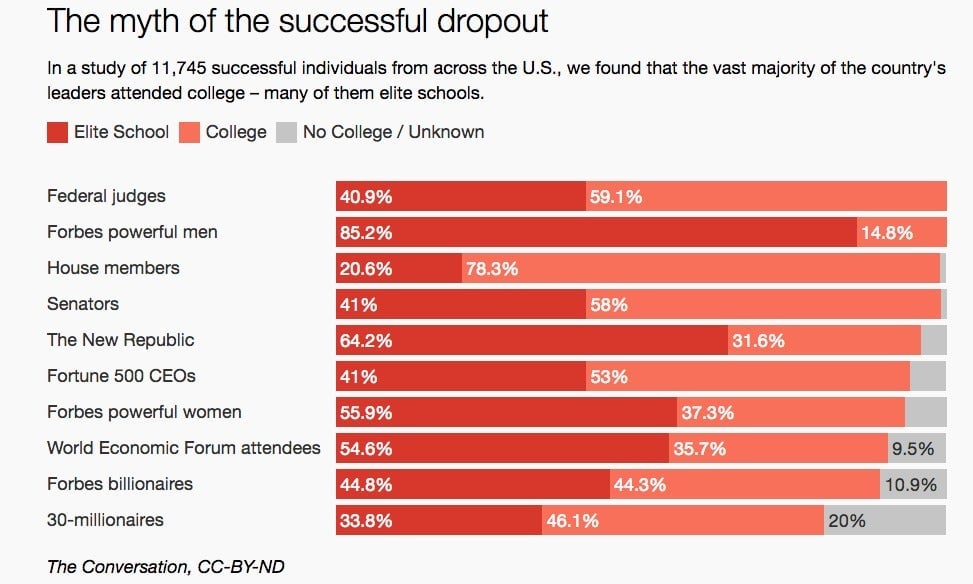Despite the myth of the billionaire college dropout, most wealthy Americans have a degree
When Facebook founder Mark Zuckerberg was asked to give this year’s commencement address at Harvard, he asked for advice from Bill Gates.


When Facebook founder Mark Zuckerberg was asked to give this year’s commencement address at Harvard, he asked for advice from Bill Gates.
Zuckerberg said, “They know we didn’t actually graduate, right?”
To which Gates replied, “Oh, that is the best part! They actually give you a degree!”
This recent exchange between two famous Harvard dropouts might lead you to think college doesn’t matter. Numerous media stories and even famous billionaires are glamorizing dropouts or encouraging kids to skip college entirely.
While it’s true there are successful college dropouts, statistically speaking, they are not the norm. As researchers in education and talent, we found that the vast majority of the country’s success stories are college graduates, such as Sheryl Sandberg (Harvard), Jeff Bezos (Princeton) and Marissa Mayer (Stanford).
The myth of the mega-successful college dropout
In a recent study, we investigated how many of the wealthiest and most influential people graduated college. We studied 11,745 US leaders, including CEOs, federal judges, politicians, multi-millionaires and billionaires, business leaders and the most globally powerful men and women.
We also examined how many people graduated from an “elite school.” (Our definition included the eight Ivy League schools, plus many of the top national universities and liberal arts colleges consistently high in the US News rankings for both undergraduate and graduate education.)

We found about 94 percent of these US leaders attended college, and about 50 percent attended an elite school. Though almost everyone went to college, elite school attendance varied widely. For instance, only 20.6 percent of House members and 33.8 percent of 30-millionaires attended an elite school, but over 80 percent of Forbes’ most powerful people did. For whatever reason, about twice as many senators—41 percent—as House members went to elite schools.
For comparison, based on census and college data, we estimate that only about 2 to 5 percent of all U.S. undergraduates went to one of the elite schools in our study. The people from our study attended elite schools at rates well above typical expectations.
Do elite schools matter?
This year, elite schools saw an increase in applications and selectivity. Research suggests there is no difference in adult income between students who attended highly selective schools and students with similar SAT scores who attended less selective schools. At least for long-term earnings, where you go may not be critical, as long as you attend and graduate.
Yet, our data show that for students with talent and motivation to make it to the top of US society, an elite college might just help you get there—whether it’s the networks you acquire or the brand on your resume.
While looking at over 11,000 successful leaders, we rarely encountered people who came from extremely poor or disadvantaged backgrounds. Helping disadvantaged talented students enter elite schools could promote diversity among future leaders.
College matters
Admittedly, the educational path of the cream of the crop may not apply to most people. So, going to college may not be the right or even the best path for everyone. However, if you’re a student thinking about not going to college or considering dropping out, remember that even Gates and Zuckerberg got into college. Even if you’re not aiming for mega success, doing the work to get into and graduate from college today may open important doors.
Perhaps in the future, college may not be as important to employers. But for now, college dropouts who rule the world are rare exceptions—not the rule.
This article was originally published on The Conversation. Read the original article.